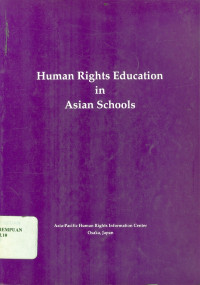
Text
Human Rights Education in Asian Schools
Human rights education in schools is not a new terrain in Asia. In Japan, the government adopted as early as 1965 a DOWA education policy to stress the importance of equality and development of the consciousness against discrimination. In Sri Lanka, a program for the teaching of human rights has been existing since 1983. In 1987, the teaching of human rights in schools became a requirement under the new Philippine Constitution although experimentation in the teaching of human rights at the primary school level started years earlier. Recently, in India, materials for human rights education in schools were developed while existing school textbooks are being reviewed to eliminate portions that contradict human rights principles and introduce new portions discussing human rights. The Cambodian government, on the other hand, has been supportive of the NGO initiative on this issue. This situation is certainly a major development in the human rights field. But this does not mean that human rights education in schools has reached a significant influence in the Asian region. It has remained a minor educational activity that needs as much support for material and human resource development as possible. Many initiatives have not yet been widely implemented in many countries; some are still being done on project basis. A major concern is on teacher training. One of the major obstacles to human rights education in schools is the lack of opportunities for teachers to study and practice new ideas in teaching human rights. Past experiences show that the very atmosphere in schools create an attitude of disrespect for human rights. The authoritarian style of teachers, for example, is not a model for understanding the practice of human rights. Teachers therefore may need to look more closely at a concept of human rights education that embodies the very idea of respect for human rights in both knowledge input and practice. A teacher training program may dwell on the following areas: concept of human rights; human rights curriculum development; preparation of materials for teaching human rights; and participant-centered teaching methods. Changing the mindset of government bureaucrats regarding the understanding of human rights and human rights education is another major concern to human rights educators. There seems to be a persistent perception that human rights is an anti-government concept and therefore useful only for those who oppose the government. Closely related is the sense of insecurity on the part of the teachers that make them think that human rights education would lead students to simply assert their rights in schools and undermine their authority. Such a wrong understanding of human rights and human rights education hinders the adoption/development of programs for teaching human rights.
Availability
| KP.1.00029 | KP.1 INT h | My Library | Available |
| KP.1.00029-01 | KP.1 INT h | My Library | Available |
Detail Information
- Series Title
-
-
- Call Number
-
KP.1 INT h
- Publisher
- Jepang : Asia Pacific Human Rights Information Center., 1998
- Collation
-
ii, 212 hlm. ;
- Language
-
English
- ISBN/ISSN
-
-
- Classification
-
KP.1
- Content Type
-
-
- Media Type
-
-
- Carrier Type
-
-
- Edition
-
1998
- Subject(s)
- Specific Detail Info
-
-
- Statement of Responsibility
-
-
Other version/related
No other version available
File Attachment
Comments
You must be logged in to post a comment
 Computer Science, Information & General Works
Computer Science, Information & General Works  Philosophy & Psychology
Philosophy & Psychology  Religion
Religion  Social Sciences
Social Sciences  Language
Language  Pure Science
Pure Science  Applied Sciences
Applied Sciences  Art & Recreation
Art & Recreation  Literature
Literature  History & Geography
History & Geography